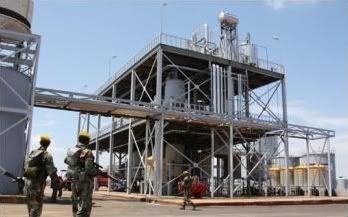Zimbabwe opens first biodiesel plant to ease catastrophic fuel shortages in farm sector

The country's dependency on imported fuels is a major constraint to virtually all economic activities, particularly the agrarian reform programme as the Zimbabwean government drives a rural modernisation programme whose success hinges on fuel availability. The biodiesel project is a culmination of years of research. In 2004, the Reserve Bank of Zimbabwe commissioned a biodiesel project at the Harare Polytechnic under which it procured a test vehicle, bio-reactor chemicals and other logistical support facilities, culminating in the "convincing" certification that biodiesel was a feasible option for Zimbabwe (previous post). The project will not just benefit the fuel sector, but is expected to have a positive impact on the rest of the economy as well through the creation of synergies.
Besides reducing fuel costs for farmers, Zimbabwe's peasants are set to benefit in a second way as a new and ready market for oil seeds emerges. Industry in general and the motoring public are also expected to operate better after the launch. The plant is being commissioned just in time for the festive season and the beginning of the summer cropping season, periods during which demand for fuel is very high.
As a nation we have once again demonstrated that the ill-fated sanctions against the innocent people of Zimbabwe can never subdue our resilience and inner propulsion to succeed and remain on our feet as a nation. Soon, our economy will be paying us back the dividends of the seedlings of progression we are planting across different productive sectors. - Robert MugabeThe Transload biodiesel plant, located 15 kilometres (10 miles) northwest of Harare, is a joint venture between a Zimbabwean and South Korean firm. The plant has a capacity of 100 million litres of biodiesel annually. The main feedstocks are cotton seed, soya beans, jatropha and sunflower seed.
Zimbabwe imports some 4.7 million barrels of oil per year. Of this, the biodiesel plant would replace more than 630,000 barrels, roughly 13 percent, and save the country 80 million US dollars per year directly. Indirect savings due to smoother food production and lowered inflation have not been disclosed.
As a people, we have demonstrated that the dark clouds of our hard times, particularly those sown by Western destructive forces, have their silver lining by way of not just strengthening our resilience, but also of deepening our scientific research and stimulating our innovativeness. - Robert MugabeZimbabwe is in the throes of an unprecedented economic crisis characterised by high inflation perched at nearly 8,000 percent, mass unemployment and chronic shortages of fuel. Fuel stations often go for months without deliveries while long queues form at the few that do receive supplies.
Mugabe's fusion of a discourse on energy security and political independence is not that far fetched: high oil prices and fuel dependence can literally destroy the economies of energy intensive, poor, oil importing countries like Zimbabwe. These developments are "exogenous" factors to which only biofuels offer an "endogenous" antidote. This is why the green fuels are often put in the ideological and geopolitical framework of economic independence and energy security.
The effect of high oil prices
More fundamentally, in least developed countries, record oil prices affect all sectors of the economy, but in particular the argricultural sector. In Zimbabwe, more than 65 percent of all people are employed in this sector. For the wealthiest countries (non-oil producing OECD), oil imports make up less than 2% of GDP, whereas for African oil importing nations this was more than 10% of GDP in 2006 (more here *.doc). In poor oil importing countries, oil price rises of the current magnitude imply a significant reduction of economic growth rates, an erosion of trade balances, rising unemployment, the destruction of the effects of debt relief efforts, and a hike in inflation rates. Of the 47 poorest countries, 38 are net importers of oil, and 25 are fully dependent on imports (more here). Zimbabwe belongs to the latter group. But there is more:
 energy :: sustainability :: biomass :: bioenergy :: biofuels :: biodiesel :: oil :: energy independence :: energy security :: food :: agriculture :: rural development :: Zimbabwe ::
energy :: sustainability :: biomass :: bioenergy :: biofuels :: biodiesel :: oil :: energy independence :: energy security :: food :: agriculture :: rural development :: Zimbabwe :: If coupled with low foreign reserves some of the effects of current high oil prices are: decreased import capacity, lower consumption and investment, lower production and employment. And as always, the poor are hit hardest as they face lower employment prospects, higher inflation (fuel, transportation, basic goods), and cuts in government spending on social services (in a recent report, when oil stood at around US$ 60 per barrel, the UN found that some of the poorest countries are already forced to spend six times as much on imported oil as on such fundamental social services as health care and education (earlier post). According to an African Development Bank document on the effects of high oil prices on African societies:
Lower employment prospects and the higher inflation rate will lower the purchasing power of the poor who have fewer (if any) instruments to hedge against the oil price increase. The biggest impact will be through higher price of kerosene which is used for cooking and lighting. The poor will also be affected by higher transportation costs. Clearly, higher petroleum costs will increase commuting costs and, especially in the case of agricultural economies, the cost of getting the crops to the markets.Given the limited availability of foreign exchange, these poor oil-importing countries face a number of options. Consumers and firms could decide to reduce their oil consumption but since the demand for oil is highly inelastic in the short-term, they may be compelled to reduce their consumption of other imported goods. Doing so could undermine economic growth especially if capital goods imports are affected.
Alternatively, countries could try to access foreign currencies to fill the gap and finance the energy bill. However, obtaining funds from private markets, bilateral and multilateral sources must be consistent with medium-term sustainability and sound debt management. In highly indebted poor countries, the only solution to fill the financing gap, and not to weaken growth, is to obtain grants or highly concessional loans. More importantly, governments will have to consider sustainable financing plans as all evidence points to oil remaining at high prices.
High oil prices will also exert a heavy toll on the budget both on the revenue and expenditure sides. On the revenue side, the tax base will be eroded if the profitability of oil-consuming companies is adversely affected and if unemployment increases. Expenditure could increase wherever governments subsidize oil products, or programs, which make intensive use of petroleum products. In that regard, an important question is if there should be complete pass-through of the oil price increase.
Governments are under heavy pressure to intervene to cushion the effect of the oil price increase. If the price of oil is not mean-reverting, price controls will lead to ever increasing losses which will ultimately be borne by current or future tax payers.
Subsidies to public utilities can also worsen the consolidated government budget deficit. In many countries electricity is produced using oil and is sold by law below its cost of production. In this case, the government will have to bear the additional expenditure from a higher oil bill. If the government does not have the resources to do so (for instance, if foreign reserves are too low), it may have to resort to rolling blackouts which have very adverse effects. Moreover, governments will themselves face higher energy bills through their own activities and that of state-owned companies.
Central banks may be tempted to tighten their monetary policy in reaction to the increase in inflation. Previous oil price shocks have produced significant increases in real interest rates which undermined domestic investment, pushed countries deeper into recession and produced stagflation. Furthermore, a rising fiscal deficit, combined with increasing public expenditures due to petrol consumption by public entities, can prompt the authorities to use monetary creation to finance the additional expenditures. As the increase in the price of oil is akin to a supply shock, an accommodating monetary policy would contribute to inflation. Non-inflationary policies are needed to avoid hyperinflation and to maintain monetary credibility.
Zimbabwe hopes that by relying on locally produced biofuels, which are expected to be less costly than imported refined petroleum products, some of the potentially disastrous effects of these many problems can be averted.
Mugabe blames the economic collapse of his country on targeted sanctions imposed on him and members of his ruling elite by the European Union and the United States following presidential polls in 2002 which the main opposition and Western observers say were rigged.
Picture: soldiers guard the Transload biodiesel plant on the outskirts of Harare. Credit: AFP.
References:
Agence France Press: Mugabe commissions Zimbabwe's first biodiesel plant - November 15, 2007.
The Herald (via AllAfrica): Zimbabwe: Government to Launch Biodiesel Plant Today - November 15, 2007.
Biopact: High oil prices disastrous for developing countries - September 12, 2007
Ralf Krüger: Impact of high oil prices on oil-importing countries in Africa [*.pdf], UNECA Project LINK meeting, Fall 2006, Geneva.
African Development Bank Group: Can Struggling African Economies Survive Escalating Oil Prices?
African Development Bank Group: High Oil Prices and the African Economy [*.doc] - Concept paper prepared for the 2006 African Development Bank Annual Meetings Ouagadougou, Burkina Faso.
Biopact: Zimbabwe's jatropha project receives US$11.6 million - May 18, 2007
Article continues
 --------------
--------------
 South Korea plans to invest 20 billion won (€14.8/$21.8 million) by 2010 on securing technologies to develop synthetic fuels from biomass, coal and natural gas, as well as biobutanol. 29 private companies, research institutes and universities will join this first stage of the "next-generation clean energy development project" led by South Korea's Ministry of Commerce, Industry and Energy.
South Korea plans to invest 20 billion won (€14.8/$21.8 million) by 2010 on securing technologies to develop synthetic fuels from biomass, coal and natural gas, as well as biobutanol. 29 private companies, research institutes and universities will join this first stage of the "next-generation clean energy development project" led by South Korea's Ministry of Commerce, Industry and Energy.

 Some biofuel skeptics have said that the production of the fuels requires large inputs of fossil fuels, and that rising energy prices will therefor severely impact profitability. Others have said biofuel production can just as well become entirely green, when fossil inputs are replaced by renewables, some of which have become competitive with fossil energy. In Brazil this is already being done routinely by utilizing waste biomass as the primary energy source for powering the ethanol factories.
Some biofuel skeptics have said that the production of the fuels requires large inputs of fossil fuels, and that rising energy prices will therefor severely impact profitability. Others have said biofuel production can just as well become entirely green, when fossil inputs are replaced by renewables, some of which have become competitive with fossil energy. In Brazil this is already being done routinely by utilizing waste biomass as the primary energy source for powering the ethanol factories.








Friday, November 16, 2007
IPCC to warn of 'abrupt' climate change: emergency case for carbon-negative biofuels kicks in
These emergency strategies, developed specifically for the grim scenario of 'Abrupt Climate Change' (ACC) consist of systems based on carbon-negative bioenergy. The Abrupt Climate Change Strategy Group (ACCS), whose mandate is to study ACC and its mitigation, writes that this concept, also known as 'bioenery with carbon storage' (BECS), is one of the few cost-effective and safe geo-engineering options that can be implemented at once and globally. If applied widely, BECS systems can radically reduce greenhouse gas emissions and bring back atmospheric CO2 levels by mid-century.
The ACCS was launched in the wake of the G8's Gleneagles Summit in 2005, to study strategies to cope with "abrupt" forms of global warming. The IPCC's new wording gives credence to the ACCS concepts. This is what ACCS scientists said in one of their papers:
So how do carbon negative bio-energy and biofuels work? They are easy to understand. Bioenergy and biofuels production is coupled to soil sequestration of biochar or to geosequestration of carbon dioxide. As biomass grows, it takes up CO2 from the atmosphere, as a carbon capturing machine. When this biomass is then used to replace fossil fuels, and burned in power plants or transformed into liquid fuels, and at the same time the carbon contained in it is captured and stored underground (either in geological formations or in agricultural soils), the net result is negative emissions.
Ordinary biofuels, nuclear power or renewables like solar or wind can never become carbon-negative and do not suffice to tackle 'abrupt climate change'. They are 'carbon-neutral' at best. Negative emissions are only achieveable with biomass coupled to carbon capture and storage (schematic, click to enlarge). By now, Biopact readers are familiar with the concept.
The fact that the IPCC has uttered the most dreadful words imaginable in the context of global warming, namely 'abrupt climate change', means carbon-negative bioenergy now has implicit backing from the leading authority on global warming. Biopact is developing a leaflet introducing BECS to wider audiences who are still not familiar with the concept. It will be available before the end of the month. The case for BECS has finally arrived.
Meanwhile, check out the following introductory scientific sources to learn more about the concept:
And the introductions at the Abrupt Climate Change Strategy Group.
Further references:
Biopact: Carbon-negative bioenergy is here: GreatPoint Energy to build biomass gasification pilot plant with carbon capture and storage - October 25, 2007
Biopact: A quick look at 'fourth generation' biofuels - October 08, 2007
Article continues
posted by Biopact team at 9:59 PM 0 comments links to this post